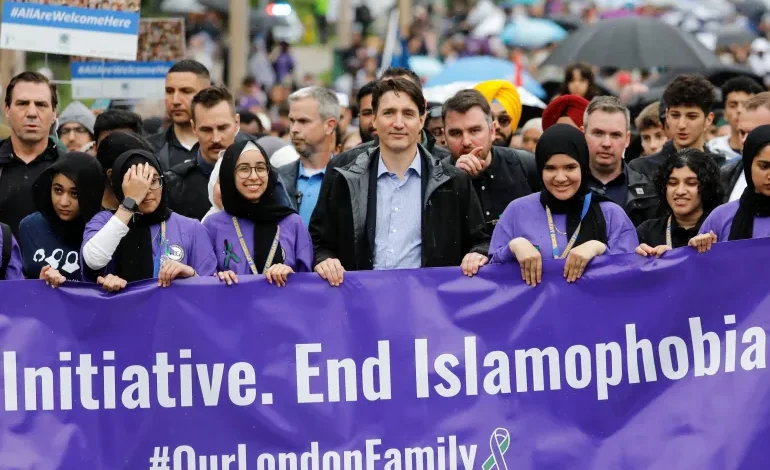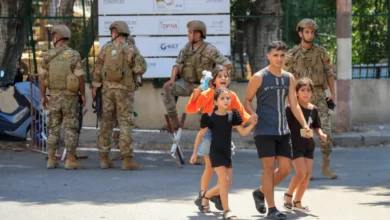Hate is alive in Canada — and is growing
Andrew Mitrovica

When the sickening attack was over, Mohammed Abu Marzouk’s skull had been fractured more than 10 times.
Moments earlier, Abu Marzouk, his wife and two young daughters had settled in their car and were about to head home after enjoying a summer’s day picnic with family and friends in Mississauga, Ontario, west of Toronto.
Just then, two men walked by. “F**king Arab people! Terrorists,” the pair shouted. “You didn’t see us?” They kicked the car.
Abu Marzouk got out. He tried talking to the angry strangers. That’s when the onslaught began. First, they punched Abu Marzouk. He fell. They kicked his head – again and again. A friend attempted, in vain, to stop the beating. He was beaten, too.
Abu Marzouk’s wife, Diane Attar, pleaded with the assailants. “Please don’t touch him, please don’t hurt my husband. I have two little girls, please don’t hurt my husband,” she said.
They kept kicking. Attar spotted a police cruiser nearby. She flagged it down for help.
Attar began to pray. As she cradled her husband, the louts kicked her too. The couple’s children cried, worried that their father was dead.
By now, blood was everywhere, spilling like an open faucet from Abu Marzouk’s ears and pooling around his shattered head. Soon, he would fall into a coma.
Later, surgeons removed part of Abu Marzouk’s skull to try to staunch the potentially lethal bleeding and pressure building inside his brain and head. He survived. The thugs were arrested and charged.
Attar told the CBC that the sudden, unprovoked horror her family had suffered in July 2018 was proof that “hate is alive” in Canada.
Last year, a federal study found that hate crimes targeting Muslims in Canada had jumped by 71 percent in 2021. The number of recorded attacks grew from 84 incidents in 2020 to 144 in 2021.
The figures, however appalling, only tell part of the unsettling story.
The study failed to address two stubborn questions. What accounts for the disturbing spike in the hate-motivated crimes Muslim Canadians have had to endure? And why do the Canadian police, prosecutors and courts appear to deal with Muslim victims of hate less seriously than attacks on other religious groups?
I think the answer to the first question informs the answer to the second.
Despite the happy pretence that Canada is an accepting place, Muslim Canadians are still largely treated as the “other” by suspicious journalists and politicians who exploit and leverage their sinister “doubts” into an audience or votes. This is a subtle, almost polite, form of Islamophobia whose cynical aim is to raise spurious questions about their loyalty to the maple leaf.
Then there are, of course, the blunt, overt examples of Islamophobia that reinforce the calumny that despite calling Canada home, the country’s Muslims will always be considered fanatical outsiders.
It was not that long ago when the former prime minister of Canada, Stephen Harper, was the proud architect of a “snitch line” that encouraged “old-stock Canadians” to inform on Muslim Canadians engaged in what he and his odious government labelled “barbaric cultural practices”.
The province of Quebec followed predictable suit by passing Bill 21 which, in the convenient name of “secularism”, banned public servants from wearing hijabs and other religious symbols.
Doubt and suspicion of Muslim Canadians – encouraged and stoked by the careless and irresponsible – have translated into harassment and violence.
In the wake of Bill 21, Muslim women living and working in Quebec have reported being spat on, called “a dirty immigrant”, having their hijabs ripped off, and being nearly run down by a pick-up truck driven by, I gather, a tolerant Quebec secularist.
Canada is becoming a dangerous place for Muslims and the police, courts and politicians are, it seems, loath to admit either that fact or their own culpability.
Initially, the two bigots who booted Abu Marzouk’s head like a soccer ball and called him a “f**king Arab” and a “terrorist” escaped being charged with a hate crime. Eventually, police concluded that the ambush had been “hate-motivated”.
That not-so-curious hesitancy turned into stunning incredulity after a judge ruled recently that while the pair were guilty of assault, he was not convinced that they had intended to kill Abu Marzouk. So, he acquitted them of attempted murder.
This, in spite of the testimony of a police officer who told the court that the attack was “the most gruesome event” he had ever witnessed.
The officer also testified that he drew his firearm because he thought the kicking “might kill” Abu Marzouk and that the attackers had refused his repeated commands to “get on the ground”, the CBC reported.
Finally, and perhaps most outrageously, while Justice Fletcher Dawson acknowledged that the assault was likely motivated by hate, he believed it to be “anti-Arab, not anti-Muslim”.
How Justice Dawson arrived at this bizarre reasoning is – to put it charitably – unclear.
But it confirms the troubling truth that when Muslim Canadians are the casualties of hate and terror, the police, prosecutors and courts are often reluctant to regard them as casualties of hate and terror.
Unsurprisingly, the same double standard prevailed even after an avowed white supremacist assassinated six worshippers in a Quebec City mosque in 2017.
At the time, Prime Minister Justin Trudeau described the premeditated massacre as a “despicable act of terror” and the provincial police investigated it “as a terrorist act”.










